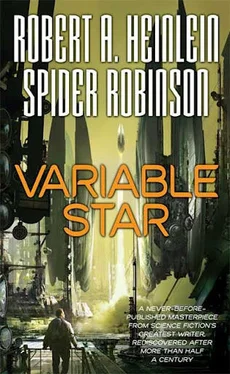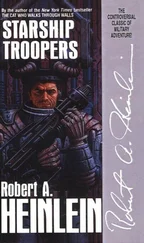For all I know, something happened in that room, every day, all day, that was simply beyond ordinary human understanding. That’s the way I lean, anyway.
The one thing I’m absolutely certain of is that my last chance to ask any of the Relativists I know about such matters is gone for good. I waited too long.
Anybody who was aboard can tell you where they were and what they were doing when it happened.
Any society has such events, benchmarks in its shared history. Usually they involve great tragedy. It may be the untimely death of some universally beloved public figure, or a natural disaster of uncommon magnitude; in the old days it was most often a war, and sometimes a plague.
But in those times, war and plague were expected dangers, and survivable ones. I doubt there have been many humans in history who’ve known anything like the instant ice-cold horror that comes to every passenger aboard a relativistic starship when they suddenly find themselves in free fall.
Where I was that day was on Bravo Ag Deck, goofing off behind the goatshed, chewing the fat with Sol Short, while the two colonists I’d drawn as my unskilled labor that shift, John Barnstead and Adewale Akbage, listened and tried not to look awed. We were passing around a flask of wine Zog had made from the Brasilian flower Muira Puama ( Ptychopetalum Olacoides ), which was making a very happy adjustment to Brasil Novo conditions.
I can even remember what we were talking about. At the gentle urging of Dr. Amy, and with Sol as intermediary, I had long since buried the hatchet with transportees Richie and Jules, going so far as to comp them for a night at the Horn so they could hear me play. It made a difference; Richie came backstage after to stare at the floor and say he “apollenized,” and Jules put one arm around me and hugged me, and from then on whenever we encountered each other in the corridors, they were both loudly friendly.
So I had begun a small but precious collection of Richieisms, and loved to compare specimens with Sol, who appreciated them as much as I did. That day, I recall, I had shared with him, “Don’t kill the goose that laid the deviled egg,” and, “You can’t sell a fuckin’ book by looking undercover.” John threw one in, then: he’d heard someone ask the pair why they were constantly together, and Richie had said, “Two heads are better than none.”
And Sol had just gifted us all with the gem “Atojiso,” as in, “I knew that would happen. I hate to say atojiso, Jules, but I fuckin’ atojiso,” and we were roaring with appreciation, when all at once the ceiling came down to join us, and the floor fell away.
Sudden unexpected Weightlessness can only mean drive failure, and this is never good news.
But if you’re on a starship, it probably means you’re dead. You and everyone in your world.
It is just barely possible to restart a quantum ramjet at velocities higher than 0.5 c . But time is critical—and luck even more so.
It had been done. Twice before in history, in each case by a Relativist said to be particularly adept. Successfully, I mean. There had been two spectacular failures—by colleagues generally agreed to have been equally good. That was why the Sheffield needed a minimum of four Relativists—six hours was the longest one could reliably sustain the necessary concentration—and why it carried six. We’d have carried more, if Kang/da Costa had been able to hire more.
If the quantum ramjet was not restarted, and damn quickly, the Sheffield would literally never get anywhere. There would be plenty of power for life support—and nowhere near enough to slow all those megatons of mass appreciably. We would drift for all time through the void at more than nine-tenths of the speed of light, forever unable to decelerate to any more reasonable speed, incapable of making any port.
John and Adewale and I were none of us spacemen. We panicked. The blood did not drain from our heads because there was no gravity; but we didn’t become as ruddy as we should have. We’d all been in free fall long enough to learn some basics, but none of us had free-fall instincts or reflexes. All we had was enough intelligence to understand how much trouble we were in.
The goats didn’t even have that—they knew only two gradations of terror: none and total. They simply happened to be right for once. The goat shed exploded, and jagged pieces of its walls became lethal Frisbees, followed by a second wave of hay, hooves, and horns.
Miraculously, none of us was hurt by any of these. It was Solomon Short who broke my collarbone, using it to launch himself toward the stairwell, and who dislocated Adewale’s shoulder using him to leapfrog, and busted John’s nose when he couldn’t get out of the way fast enough. I figure I’m responsible for my concussion; I could probably have ducked that goat, if I hadn’t been watching Sol dwindle in the distance. But how can you look away from somebody crying like that?
To be honest, I don’t think I’d have been much help to him even if I hadn’t gotten my skull kicked. I was already thinking in terms of coping with my own responsibilities: my livestock, my farm—both my farms! Everywhere, things would be going to hell, delicate hydraulic systems pumping dry, containers spilling over, lattices coming apart, koi trying to swim in damp air—
So it was John, not even particularly a friend of Sol’s, who thought of it first, and did it in time, and so ended up accomplishing far more good than I would that day. The instant he had drifted within reach of something substantial enough to change his vector—a light fixture in the ceiling, still on, still hot—he used it to launch himself after Sol. He stayed close to the ceiling, and used every surface feature he passed to add speed, so he had soon built up nearly as good a head of steam as Sol had.
At about that point I heard the right rear quadrant of my skull make the sound “KLOP!” and decided to take a little nap, so I missed John’s triumph.
Sol had sensibly ignored the lift, beelined for the emergency stair-shaft/drop-chute, and flung himself down it like a hungry ferret going down a hole. It was the mental picture of him in that ship-length tunnel, reaching ever higher velocity with the help of the handholds that were usually rungs under gravity, that had galvanized John. He was far less free-fall savvy than Sol, but massed more, so he arrived at about the same speed. He knew there was no way he’d make the turn. But he never even attempted to decelerate, just sailed into the chute, slammed against its far wall, and accepted the damage. “FLIP! FLIP!” he was screaming as he came through the doorway, and after he crashed and got his breath back, he resumed screaming it at the top of his lungs down that long Freudian shaft. “FLIP, SOL! FOR CHRISSAKE, FLIP!”
Would I have understood what he was saying, if I’d heard it? Interesting and pointless question. Adewale said later he did hear it, and didn’t get it—as far as he could see, everyone around there had flipped.
Halfway down that stair-shaft—any and all gods be thanked, once they’ve been cleared of any involvement in the original catastrophe—Solomon Short heard John Barnstead’s scream. He was then in a kind of frenzy, or fugue state, as fixated as a heat-seeking warhead. But John had selected a word from the tactical menu used by warheads. It was a legal command, and as Sol received it he instantly saw the sense of it and obeyed. By a process that has never been properly described because everyone who’s spent time in free fall knows it, and nobody who hasn’t can ever understand it, Sol tumble-flipped his body end over end, and continued his plunge feet first.
John’s mental process had gone more or less like so: If Sol is the first Relativist to reach the Power Room, we’re all screwed. By the time he can get there from this far away, the ramjet will probably have been off too long to restart safely. So we must pray that another of his colleagues beats him there.
Читать дальше










